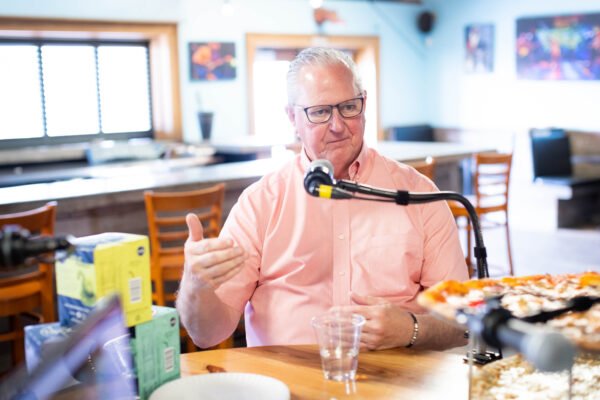Around 70% of the US economy is driven by consumer spending. In other comparable economies, it’s different. Canada, France, Germany and Japan, all peg consumer spending at around 50%. What this means is, the enormous might of the world’s most powerful military and globally dominant financial system, is powered by you and me, buying stuff. That, in turn, relies on manufacturers making stuff we want to buy. And “want” is the operative word here. If we lived in a utilitarian society and only bought what we actually need, the wheels would fall off the US economy.
Peter Ricchiuti’s guests on this edition of Out to Lunch are both great examples of how we all keep these wheels turning.
Cinched
If you wear pants, you could get away with owning 2 pairs. But if you’re an average American, you own many more than that. Reportedly, the average American owns 9 pairs of pants. Most of these pants have belt loops at their waist. You can only wear one belt at a time, so you could conceivably hold all of your pants up with the same belt. But, as you know, you don’t. Because the success of the country is depending on you buying stuff, you have a bunch of belts.
If you go down River Road and stop in at Torino Leather Company – or visit it online – you can choose from over 40,000 belts – made from regular cowhide or more exotic materials like lizard, ostrich, tiger shark, and python.

Tom Garner, Torino Leather Company makes belts and sells them across the country and from its factory store on River Road
Tom Garner started working at what was then the Torino Belt Company in 1999. In 2006 Tom and three co-workers bought the business. In the intervening years they’ve built Torino Leather into a company with 30 employees and today they sell their belts across the country, in stores as wide-ranging as Dillard’s and Saks Fifth Avenue.
Sober
There’s nothing more basically utilitarian than drinking. Human beings have to drink to survive. We could drink only water. But what kind of consumer-driven economy would we have if we did that?
Over the span of human history we’ve come up with all kinds of different liquids to consume. Among the most popular is alcohol. Living in New Orleans, you might have a slightly skewed perspective on this, but across the country, a younger generation is turning away from alcohol. A whole new industry has grown up to cater to these folks, making what are called “mocktails.” Mocktails are drinks you drink when you don’t want to drink. They taste like a cocktail, but they have extremely low or absolutely zero alcohol.
New Orleans is not only “the home of the cocktail,” we’re also the home of a growing brand of mocktails, called Mockly, the brainchild and growing business of husband-and-wife team, Tarik and Aimee Sedky.

Aimee Sedky, her company Mockly is adding “home of the mocktail” to New Orleans’ traditional “home of the cocktail”
When we talk about the US economy, there’s general agreement that we need to encourage and grow as much manufacturing as we can, rather than see it shipped offshore to other countries. However, when we talk about the local New Orleans economy, we tend to focus on hospitality, tourism, conventions and music. It’s pretty rare to hear any conversation about growing the local New Orleans manufacturing sector. But there certainly is one. And its contribution to the general US economy is worth acknowledging.
Aimee Sedky and Tom Garner are great examples of local manufacturers. They have two very different products, and are at very different stages of development and growth, but Torino Leather and Mockly are both New Orleans companies with a nationwide impact.

Peter Ricchiuti, Aimee Sedky, Tom Garner, Out to Lunch at NOLA Brewing
Out to Lunch is recorded live over lunch at NOLA Pizza in the NOLA Brewing Taproom. Photos by Jill Lafleur.




